League of Olympic Swim Legends: Kosuke Kitajima Tops 100m Breaststroke Podium With Hencken & Peaty
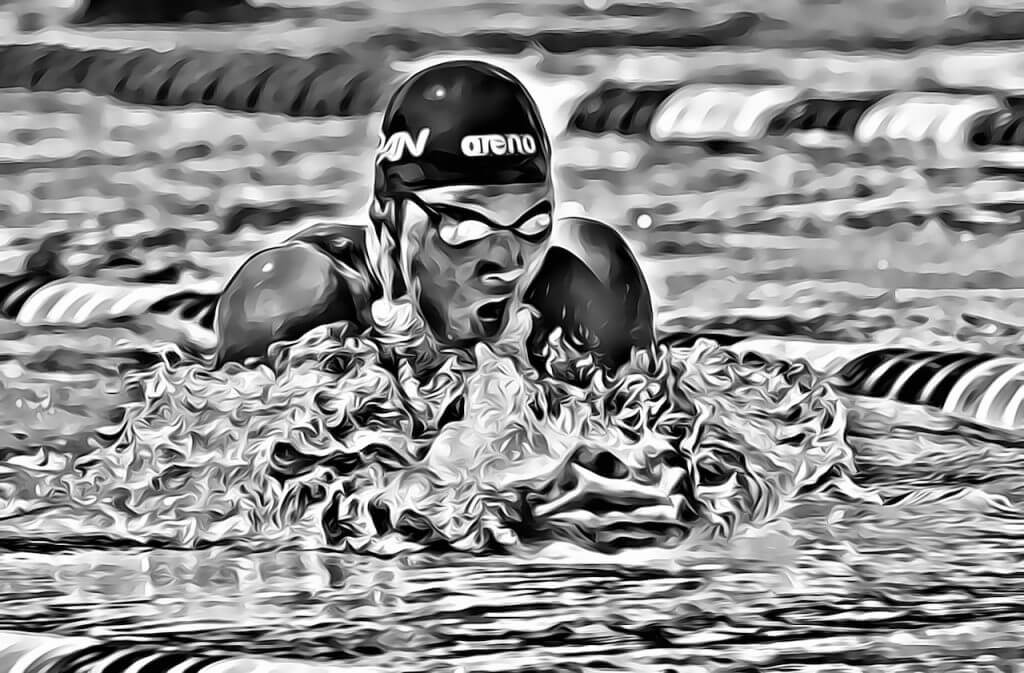
What would have unfolded had Tokyo 2020 gone ahead as planned this week – and where would it all have fit in the thread of Olympic swim legends like Kosuke Kitajima, John Hencken and Adam Peaty? To mark the eight days over which the Tokyo 2020 Olympic Games would have unfolded had the coronavirus pandemic not forced postponement, the team at Swimming World is filling the void with a Virtual Vision Form Guide and League of Olympic Swimming Legends.
Tokyo Vision: Adam Peaty Seeks to Join Kosuke Kitajima in 100 Breaststroke Pantheon
Day 2, event 2 – King Frog with an Olympic double double …
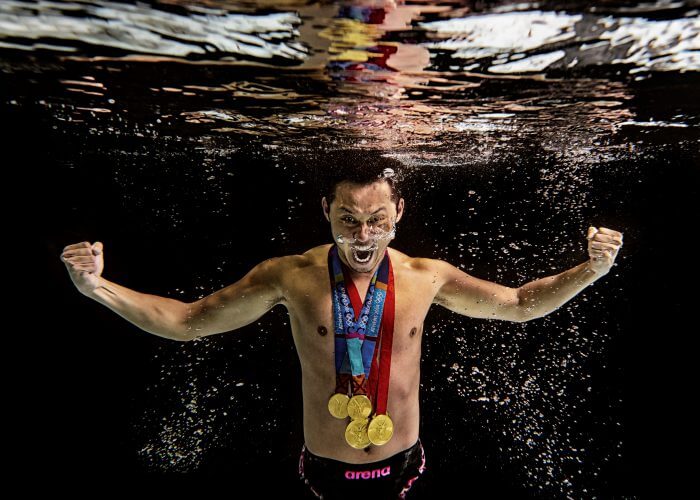
Kosuke Kitajima – Photo Courtesy: Junya Nishigawa
Men’s 100m Breaststroke
The Podium
- Kosuke Kitajima (JPN)
- John Hencken (USA)
- Adam Peaty (GBR)
The Other Finalists (Listed Alphabetically):
- Chet Jastremski (USA)
- Adrian Moorhouse (GBR)
- Nobutaka Taguchi (JPN)
- Steve Lundquist (USA)
- Cameron van der Burgh (RSA)
- Our Lane 9* place goes to a man whose Olympic gold medals were earned with teammates in medley relays, his solo efforts resulting in silver and bronze eight years apart, with a fourth in the middle, two world titles and two world records in the mix, a worthy extra for our legends line-up:
- Brendan Hansen (USA)
All-Time Battle Of Olympic Swim Legends Goes To Kosuke Kitajima
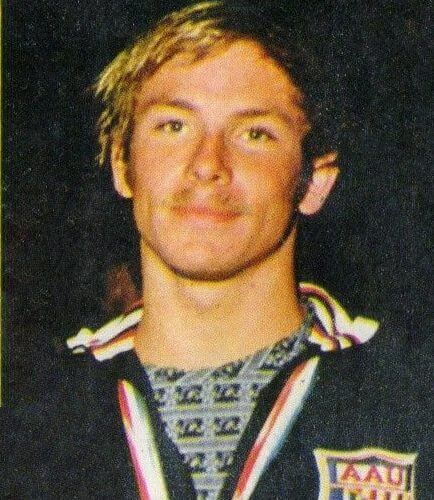
John Hencken
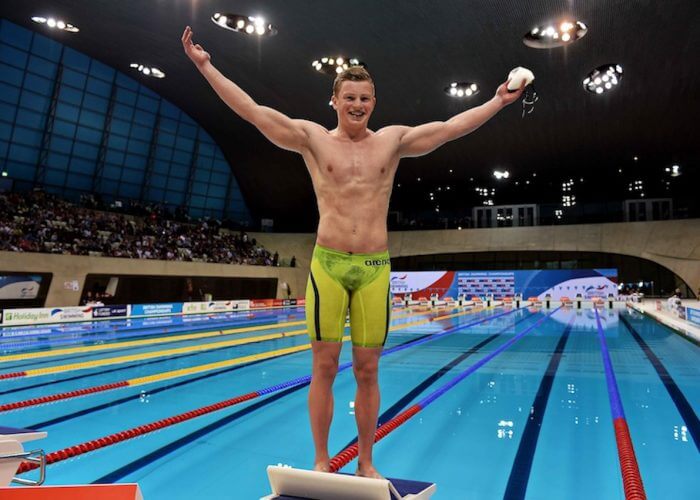
World record & Pioneer Adam Peaty celebrates his 57.92 World record at the London Aqiatics Centre in 2015 – by
Gian Mattia D’Alberto / lapresse
The truth is, if this Legends exercise is conducted after next summer’s Olympic Games, there is a good chance the podium will look different. For now, though, Japan’s Kosuke Kitajima is the sole man to defend Olympic gold in the 100 breaststroke, and the Frog King gets the nod over American John Hencken and Great Britain’s Adam Peaty, the reigning Olympic titlist.
Controversy surrounded Kitajima’s initial Olympic win, as video footage showed him using dolphin kicks (then banned) off the start and turn en route to victory over American Brendan Hansen. Yet, Kitajima returned to the Olympic stage four years later and achieved the difficult feat of defending, doing so in 58.91 to become the first man to go under 59 seconds.
The 1976 Olympic champion, Hencken picked up the silver medal behind Kitajima, a bronze medal from the 1972 Games also helping his case. Equally adept over the 100 and 200 distances, Hencken set seven world records in the 100 breaststroke and was the world-record holder in the event from 1973 to 1977.
The only man under 58 and 57 seconds, Peaty has spent the past five years redefining the event. The Brit has built a chasm between himself the competition and is the overwhelming favorite to add a second Olympic gold when the Tokyo Games are held next summer. Should Peaty repeat, he would match Kitajima and, given his dominance, would jump to the top of the Legends podium.
Underwater of Kosuke Kitajima’s Technique
Olympic Swim Legends – Our Winner’s Winning Ways:
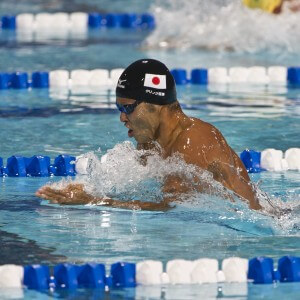
Kosuke Kitajima – Photo Courtesy: Peter H.Bick
Kosuke Kitajima’s First Olympic Gold
2004 Athens – Men 100m Breaststroke: Athletes: 60; Nations: 55
- 1:00.08 Kosuke Kitajima JPN
- 1:00.25 Brendan Hansen USA
- 1:00.88 Hugues Duboscq FRA
- 1:01.17 Mark Gangloff USA
- 1:01.34 Vladislav Polyakov KAZ
- 1:01.36 James Gibson GBR
- 1:01.66 Darren Mew GBR
- 1:02.42 Oleg Lisogor UKR
Date of final: August 15, 2004
On June 29, 2001, in Moscow at the Russian Championships, and in the same pool that witnessed the first sub-15-minute 1,500m by Vladimir Salnikov in 1980, Roman Sloudnov, of Omsk, clocked 59.97sec to become the first swimmer to race inside the magic minute in the 100m breaststroke. The barrier was broken on freestyle in 1922, butterfly in 1960 and backstroke in 1964.
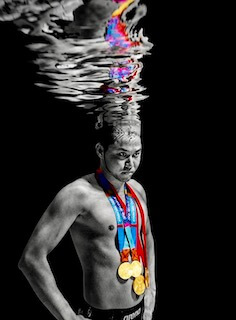
Kosuke Kitajima in the depths of the Pantheon with his four Olympic golds – Photo Courtesy: Junya Nishigawa, Olympus Digital
The day before his biggest moment in June 2001, Sloudnov clocked 1:00.26, a world record, and a month later won the world title in 59.94, a world record by 0.03. His efforts brought an invitation to a Sprint Cup in New York on October 20. He travelled from Siberia to Moscow for his visa, discovered that the US Embassy was closed due to a terrorist bomb threat, and went home empty-handed. Sloudnov then went through lean times, failing to make the 2003 World Championships.
By the time he arrived in Athens for the 2004 Games, two other men had followed him below the minute. Kosuke Kitajima (JPN), born September 22, 1982, in Tokyo, stood just 1.77m tall and weighed in at 71kg. He was big in the water though: at Barcelona in 2003, he won the 100m and 200m world titles in world records of 59.78 and 2:09.42 ahead of Brendan Hansen (USA).
Kitajima had given warning at the World University Games in Busan in 2002, when he became the first man to race inside 2:10 in the 200m, breaking American Olympic champion Mike Barrowman’s 1992 standard of 2:10.16 with a 2:09.97 victory.
In July, 2004, at US Olympic trials in Long Beach, Hansen rattled the world of breaststroke with world records of 59.30 and 2:09.04. The stage was set for a showdown in Athens. The mood was particularly tense because of events surrounding Kitajima’s style. He provoked a protest at the World Championships in Barcelona, with Americans claiming that he was using a butterfly action underwater out of turns. These protests were lodged again at the 2004 Olympic Games in Athens.
In the 100m heats, Kitajima threw down the gauntlet with a 1:00.03 Olympic record. Hansen struck back in the first semi-final with 1:00.01, Kitajima winning the second semi in 1:00.27. In the final, thin air and the naked eye were challenged at the 50m mark, Hansen turning first in 28.22 ahead of Hugues Dubosq (FRA), on 28.25, and Kitajima on 28.26. With 15m to go, the battle for gold came down to Hansen and Kitajima. The world champion put in a frenetic and powerful last few strokes as the American tightened. The fight was over in 1:00.08 in favour of Kitajima, Hansen 0.17sec back, with Dubosq claiming bronze in the only other sub-1:01 effort.
Kitajima leapt out of the water and issued a primordial scream: “Cho-kimochi-ii”. That turned out to mean: “I feel mega-good”. That expression won Kitajima a second prize: the 2004 U-Can Neologisms and Vogue Words contest.
The frustration that had bottled up in Kitajima exploded in a poolside outburst after he set an Olympic record of 2:09.44 in the 200m three days later. Said the champion:
“That talk about the kick just motivated me all the more to stick it to them. They can stop talking now.”
Kosuke Kitajima was never disqualified but the incident prompted the FINA Technical Swimming Committee to remove doubts over interpretation of rules by subsequently allowing one dolphin kick out of breaststroke starts and turns. In 2005, Kitajima lost both his world titles to Hansen, who in 2006 left the world records at 59.13 and 2:08.50.
In the last Olympic year of his career in 2012, Kosuke Kitajima was at his fastest ever in textile, on 58.90, 0.09sec shy of the national record he established at Beijing 2008:
, with Hansen finally finishing ahead of him – for bronze
Another Great 100m Breaststroke Race In History
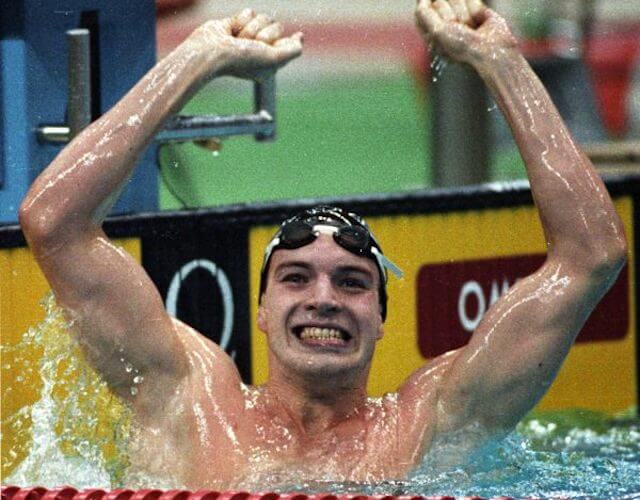
Adrian Moorhouse – Photo Courtesy: City of Leeds Swimming Club
1988 Seoul – Men 100m Breaststroke – Athletes: 61; Nations: 45
- 1:02.04 Adrian Moorhouse GBR
- 1:02.05 Karoly Guttler HUN
- 1:02.20 Dimitri Volkov URS
1:02.38 Victor Davis CAN
1:02.50 Tamas Debnar HUN
1:02.55 Richard Schroeder USA
1:02.93 Gianni Minervini ITA
1:03.43 Christian Poswiat GDR
Date of final: September 19, 1988
When Adrian Moorhouse (GBR) was 12, he had watched the 1976 Olympics on television as fellow Briton David Wilkie sped to the gold medal in the 200m breaststroke. A passion was born. Moorhouse suffered the disappointment of a fourth place in the 100m at the 1984 Games but before he returned home he received a telegram from former teacher Geoff Carter. It read:
“Very bad luck – all proud of you – there will be a next time.”
Moorhouse put the telegram in safe-keeping and four years later placed it in his luggage before setting out to Seoul for the 1988 Games with more experience under his belt, not all of it good. At the 1986 World Championships he was disqualified but he had won the 1985 and 1987 European crowns and topped the world rankings in all years from 1985 to 1988.
In the heats in Seoul, Moorhouse, coached by Terry Denison at the City of Leeds Swimming Club, set the fastest time in heats with a 1:02.19 that left him just 0.06sec shy of his European record, with Victor Davis (CAN) and Dimitri Volkov (URS), the main threats to Moorhouse, next through.
In the final, Volkov, as was his way of racing, rocketed ahead to turn first in 28.12. Moorhouse was back in sixth on 29.42. In the last 15m, Karoly Guttler (HUN) surged ahead to challenge the Soviet swimmer but the momentum was with the man now roaring through the field: Moorhouse. What the naked eye could not see (even on the slow-motion playback), the clock decided: Moorhouse was champion in 1:02.04, Guttler second 0.01sec away and Volkov hanging on for bronze 0.18sec ahead of Davis.
After the medal ceremony, Moorhouse placed the telegram from his teacher in the presentation box next to his golden prize. There had indeed been a next time.
But not for Davis after Seoul. On November 13, 1989, the Canadian was killed when he was struck by a car outside a bar following an altercation. His ashes were scattered at sea along with a quart of water from lane 5 of the University of Southern California pool in Los Angeles, where he had celebrated his finest sporting moment, the Olympic title in the 200m breaststroke at the 1984 Games.
How the race panned out:
And where the pace got to in 2016:



